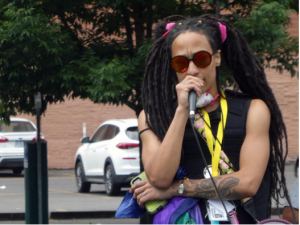By: Rebecca Buchanan
Impunity Watch Staff Writer
WASHINGTON, D.C. – On November 13, 2020, The Inter-American Commission on Human Rights (IACHR) issued a press release expressing concern over the human rights of U.S. sex workers during the COVID-19 pandemic.

The statement called for the U.S. government to strengthen its guarantees that individuals engaged in sex work would maintain their environmental, economic, social, and cultural rights, particularly during the pandemic’s containment and mitigation measures. The IACHR reiterated its belief that the discrimination and stigma facing sex workers in the United States pose a great risk to human rights and dignity and must be eliminated.
In its press release, the IACHR drew on information from reports indicating that sex workers throughout the United States have experienced increased violence, discrimination, and poverty during the pandemic. The stay-at-home orders and social-distancing measures instituted in most U.S. states have severely decreased opportunities for income through sex work, leaving these workers unable to cover the costs of basic needs and essential services. When reaching out for help, individuals engaged in sex work have been met with dwindling opportunities for housing, a lack of accessible healthcare, and exclusion from many social assistance programs.
Sex work is criminalized in most U.S. states, leaving sex workers dangerously excluded from State registration systems, social services, and necessary healthcare provisions. The COVID-19 pandemic has exacerbated these unstable conditions, leaving sex workers especially vulnerable to the virus and its larger effects. Businesses providing sex work were banned from receiving U.S. Small Business Administration Loans, which offered relief to businesses struggling as a result of the pandemic because of a stipulation excluding live performances or services of a “prurient sexual nature.”
Spurned by the U.S. government, sex workers and the businesses that employ them have been forced to turn elsewhere for assistance. The Haymarket Pole Collective, an Oregon based group that advocates for Black and Indigenous strippers and other strippers of color, recently received a grant from the Oregon Health Authority. The $600,000 grant will be used to fund relief and wellness kits which will include mail-in COVID-19 infection test kits, in addition to other necessities.
The work of the Haymarket Pole Collective addresses the impact of sex work discrimination on minorities, which are often disproportionally affected by situations of emergency or social unrest. In its statement, the IACHR expressed fears that minority populations within the sex work community face rapidly increasing prejudice and discrimination during the pandemic. In particular, the IACHR highlighted the uniquely hostile situation of transgender sex workers who often lack government identification documentation aligned with their gender identity or expression. As a result, transgender sex workers “are exposed to the dual denial of various essential services, including health.” The IACHR called on the U.S. to guarantee that transgender individuals receive adequate care policies and health services respectful of their gender identity.
Finally, the IACHR noted the increased potential for police violence against sex workers as tensions around the pandemic continue to grow. The IACHR urged the U.S. to implement training programs for police officers, medical officials, and social services personnel regarding the social, economic, and human rights of sex workers. If properly implemented, these trainings could provide sex workers with greater access to social welfare systems and allow for more accurate reporting on situations of sexual slavery, labor exploitation, and human trafficking.
For further information, please see:
Amnesty International – Include Sex Workers in the COVID-19 Response – 28 July 2020